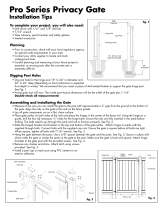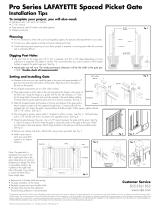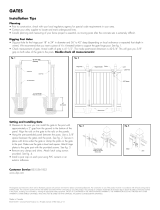Page is loading ...

©2019 Universal Forest Products, Inc. All rights reserved.
68956 U.S. Hwy 131, White Pigeon, MI 49099 1-855-556-1852 10551_3/19
www.ufpi.com
PREPARATION:
Check local ordinances and regulations before building your fence.
Before construction, contact your local utility companies to mark any
underground cables and pipelines. In addition, it is a good idea to
discuss plans with any neighbors along your proposed fence line.
DIGGING POST HOLES:
Dig post holes 18" to 24" in diameter and 36" to 48" deep
(depending on local ordinance or expected frost depth in winter).
Backfi ll the holes with 6" of gravel.
The gate can be set up left swing or right swing. Consider swing
direction when determining which post will be your hinge post.
Mix concrete in the hole for the hinge post per the instructions on
the bag. Install the post into the hole and tap the post to the proper
depth. We recommend inserting a piece of 4x4 to support the gate
hinge post. Using a level, ensure post is plumb. Brace the post with
temporary supports as the concrete sets (per the instructions).
Repeat with second hole.
Preparation and Digging Post Holes
Assembling and Hanging the Gate
6' X 42" BOARD-ON-BOARD PRIVACY GATE – ASSEMBLY INSTRUCTIONS
36" to 48"
In-Ground
18" to 24" Dia. Hole
Filled with Concrete
4x4 Wood
Insert
Hinge Post
Latch Post
44" Gate
Opening
42-3/4" W
68-1/2" h
• 2 – Top/Bottom Rails
• 2 – Gate Jambs with covers
• 4 – Pickets
• Hardware Kit
ITEMS YOU MAY NEED:
• Drill driver with 1/8" and 1/4" Drill bits
• 7/16" wrench
• Tape measure
• Pencil
• Safety glasses
• 4x4 treated wood post
• Blocks or clamp
KIT CONTENTS:
STEP 1
Lay out all four pickets so they face
the same way. Slide each picket into
the next, snapping into place.
Continued on next page.
Patent-pending technology

©2019 Universal Forest Products, Inc. All rights reserved.
68956 U.S. Hwy 131, White Pigeon, MI 49099 1-855-556-1852 10551_3/19
www.ufpi.com
6' X 42" BOARD-ON-BOARD PRIVACY GATE – ASSEMBLY INSTRUCTIONS
©2019 Universal Forest Products, Inc. All rights reserved.
68956 U.S. Hwy 131, White Pigeon, MI 49099 1-855-556-1852 10405_1/19
www.ufpi.com
STEP 5
Align the rails on the gate with the rails on the existing fence. There
must be at least a 2" gap from ground to bottom rail for the gate to
function properly. Test swing direction before attaching brackets to
post.
Secure the gate in place with blocks under the gate or clamp the
jamb on the gate to the post. Adjust hinges to make sure the gate
is level and square. To adjust hinges, move hex nuts in or out as
needed and tighten with a wrench.
Attach hinged brackets to the hinge post with the provided screws.
Remove the blocks and clamps. Readjust hinges as needed so gate
is square and level with equal spacing between the gate and posts.
STEP 6
Attach latch to post and striker to gate in the desired location using
the screws provided.
Note: The gate latch is designed to be used on the left or right
hand side of the gate. The latch is assembled, ready to be installed
on the right hand side of the gate. If
you desire to switch the latch, follow
these steps:
- Remove the 2 shoulder bolts and
spring.
- Change orientation of the clicker.
- Re-attach spring and insert
shoulder bolts.
- Shoulder bolts must be fully
tightened.
Assembling and Hanging the Gate continued
Fig.6 DoverLatch.ai
Latch
Striker
STEP 2
Slide the rails onto the assembled pickets.
STEP 3
Place gate jambs on both sides of the rails. Ensure the rails are
fully inserted into the jambs.
Considering your swing direction, slide the hinged brackets and
non-hinged brackets onto the gate jambs in the center of the top
and bottom rails. Using the holes in the brackets as a guide, drill
¼" holes through the jamb and rail for the bolts. The bolts need to
go through the jamb and rail to function properly.
STEP 4
Insert the bolts into the predrilled holes and loosely attach the
nuts (these will be tightened later). Once all brackets are loosely
fastened, measure gate from corner-to-corner to ensure gate is
square. Adjust as necessary. When square, tighten all bolts with
a 7/16" wrench. Do not over-tighten as it may crush the gate jambs.
Bracket
Gate Cap Screw
Gate Cap
Cap Nuts
Hinged
Bracket
Through
Bolts
Gate
Jamb
THE DIAGRAMS AND INSTRUCTIONS IN THIS BROCHURE ARE FOR ILLUSTRATION PURPOSES ONLY AND ARE NOT MEANT TO REPLACE A LICENSED PROFESSIONAL. ANY CONSTRUCTION OR
USE OF THE PRODUCT MUST BE IN ACCORDANCE WITH ALL LOCAL ZONING AND/OR BUILDING CODES. THE CONSUMER ASSUMES ALL RISKS AND LIABILITY ASSOCIATED WITH THE
CONSTRUCTION OR USE OF THIS PRODUCT. THE CONSUMER OR CONTRACTOR SHOULD TAKE ALL NECESSARY STEPS TO ENSURE THE SAFETY OF EVERYONE INVOLVED IN THE PROJECT,
INCLUDING, BUT NOT LIMITED TO, WEARING THE APPROPRIATE SAFETY EQUIPMENT. EXCEPT AS CONTAINED IN THE WRITTEN LIMITED WARRANTY, THE WARRANTOR DOES NOT
PROVIDE ANY OTHER WARRANTY, EITHER EXPRESS OR IMPLIED, AND SHALL NOT BE LIABLE FOR ANY DAMAGES, INCLUDING CONSEQUENTIAL DAMAGES.
Ground Line
Latch Post
Hinge Post
Hinged Brackets
StrikerLatch
2" gap
5/8" Space

©2019 Universal Forest Products, Inc. Todos los derechos reservados.
68956 U.S. Hwy 131, White Pigeon, MI 49099 1-855-556-1852 10551_3/19
www.ufpi.com
PREPARACIÓN:
Revise las ordenanzas y regulaciones locales antes de instalar su cerca. An-
tes de iniciar la construcción, contacte a las compañías de servicios públicos
locales para identifi car la presencia de cualquier cable o tubería subterránea.
Además, es una buena idea hablar sobre sus planes con cualquier vecino
que vaya a estar en la línea en la que piensa instalar su cerca.
EXCAVACIÓN DE LOS HOYOS PARA LOS POSTES:
Cave agujeros para postes de 45.7 a 61 cm (18 a 24 pulg.) de diámetro y
de 91.4 a 122 cm (36 a 48 pulg.) de profundidad (dependiendo de las orde-
nanzas locales o la profundidad de la congelación esperada en el invierno).
Rellene los agujeros con 15.2 cm (6 pulg.) de grava. Vea la fi gura 1.
La puerta puede instalarse con giro a la izquierda o a la derecha. Tome en
cuenta la dirección del giro cuando determine cuál será el poste con las
bisagras. Mezcle concreto en el agujero del poste con las bisagras siguiendo
las instrucciones de la bolsa. Instale el poste en el agujero y húndalo hasta
la profundidad correcta. Recomendamos insertar un trozo de tabla de 10.2
x 10.2 cm (4 x 4 pulg.) para sostener el poste con las bisagras. Use un nivel
para asegurarse de que el poste está perfectamente vertical. Fije el poste
con apoyos temporales mientras el concreto se seca (de acuerdo con las
instrucciones).
Repita en el segundo agujero.
Preparación y excavación de los hoyos para los postes
Ensamblado y colocación de la puerta
PUERTA DE PRIVACIDAD DE TABLAS ENGANCHADAS DE 6 PIES X 42 PULG. –
INSTRUCCIONES DE ARMADO
Inserto de
madera de 4x4
Poste de
la bisagra
Poste del
pestillo
44 pulg.
Apertura
de la puerta
Hueco con un diámetro
de 18 a 24 pulgadas
llenado con concreto
36 a 48
pulgadas
En el suelo
42-3/4" A
• 2 – Rieles superior/inferior
• 2 – Jambas con cubiertas
• 4 – Tablas
• Juego de herrajes
ARTÍCULOS QUE PUEDE NECESITAR:
•
Destornillador eléctrico con
puntas de 3.2 mm (1/8 pulg.)
y 6.4 mm (1/4 pulg.)
• Llave de 1.1 cm (7/16 pulg.)
• Cinta métrica
• Lápiz
UN KIT INCLUYE:
PASO 1
Acomode las cuatro tablas de modo
que estén orientadas en la misma
dirección. Deslice cada tabla dentro
de la siguiente, fi jándolas en su sitio.
Continúa en la siguiente página.
Tecnología con patente pendiente
• Safe Lentes de seguridad
• Poste de madera tratada de
10.2 x 10.2 cm (4 x 4 pulg.)
• Bloques de soporte o
abrazadera
68-1/2" An

©2019 Universal Forest Products, Inc. Todos los derechos reservados.
68956 U.S. Hwy 131, White Pigeon, MI 49099 1-855-556-1852 10551_3/19
www.ufpi.com
PUERTA DE PRIVACIDAD DE TABLAS ENGANCHADAS DE 6 PIES X 42 PULG. –
INSTRUCCIONES DE ARMADO
©2019 Universal Forest Products, Inc. All rights reserved.
68956 U.S. Hwy 131, White Pigeon, MI 49099 1-855-556-1852 10405_1/19
www.ufpi.com
PASO 5
Alinee los rieles de la puerta con los rieles de la cerca existente. Debe
quedar un espacio de por lo menos 5.1 cm (2 pulg.) entre el piso y el riel
inferior para que la puerta funcione correctamente. Pruebe la dirección
del giro antes de fi jar los soportes al poste.
Fije la puerta en su sitio colocando bloques de soporte bajo la puerta
o fi jando la jamba de la puerta al poste usando una abrazadera. Ajuste
las bisagras para asegurarse de que la puerta está al nivel correcto y
recta. Para ajustar las bisagras meta o saque las tuercas hexagonales
un poco, según sea necesario, y apriételas con una llave.
Fije los soportes con bisagra al poste de las bisagras usando los tor-
nillos incluidos. Quite los bloques de soporte y las abrazaderas. Vuelva
a ajustar las bisagras si es necesario, hasta que la puerta esté recta y
nivelada, con una separación igual entre la puerta y los postes.
PASO 6
Fije el pestillo al poste y una plancha de cerradura a la puerta en el
lugar deseado, usando los tornillos incluidos.
Nota: El pestillo de la puerta está diseñado para usarse en el lado
izquierdo o derecho de la puerta. El pestillo viene ensamblado, listo
para instalarse en el lado derecho de
la puerta. Si desea cambiar el lado del
pestillo, siga estos pasos:
- Quite los 2 tornillos de hombro y
el resorte.
- Cambie la orientación del selector.
- Vuelva a colocar el resorte e inserte
los pernos de hombro.
- Los pernos de hombre deben
apretarse completamente.
Ensamblado y colocación de la puerta
Pestillo
Fig.6 DoverLatch.ai
Plancha
de cerradura
PASO 2
Deslice los rieles en las tablas armadas.
PASO 3
Coloque las jambas de la puerta en ambos lados de los rieles.
Asegúrese de que los rieles queden completamente insertados en
las jambas.
Tomando en cuenta la dirección de giro de la puerta, deslice los
soportes con bisagra y los soportes sin bisagra en las jambas de la
puerta, en el centro de los rieles superior e inferior. Usando como guía
los agujeros de los soportes, taladre dos agujeros de 6.4 mm (¼ pulg.)
que atraviesen la jamba y el riel, para insertar los pernos. Los pernos
tienen que atravesar la jamba y el riel para funcionar correctamente.
PASO 4
Inserte los pernos en los agujeros taladrados y coloque las tuercas sin
apretarlas (las apretará más adelante). Una vez que todos los soportes
estén sujetados sin apretarlos, mida la puerta de esquina a esquina
para asegurarse de que está cuadrada. Ajústela si es necesario.
Cuando esté cuadrada, apriete todos los pernos con una llave de 1.1
cm (7/16 pulg.). No los apriete demasiado, ya que podría aplastar las
jambas.
Soporte
Tornillo para la tapa de la puerta
Tapa de la puerta
Tapones
roscados
Soporte
abisagrado
Perno
Jambas de
la pueta
LOS DIAGRAMAS E INSTRUCCIONES DE ESTE FOLLETO SON PARA FINES ILUSTRATIVOS SOLAMENTE Y NO ESTÁN DESTINADOS A REEMPLAZAR A UN PROFESIONAL MATRICULADO. CUALQUIER CON-
STRUCCIÓN O USO DEL PRODUCTO DEBEN ESTAR DE ACUERDO CON TODOS LOS CÓDIGOS LOCALES DE CONSTRUCCIÓN Y/O DE ZONIFICACIÓN. EL USUARIO ASUME TODOS LOS RIESGOS Y RESPONSABILI-
DADES ASOCIADOS CON LA CONSTRUCCIÓN O EL USO DE ESTE PRODUCTO. EL USUARIO O CONTRATISTA DEBEN TOMAR TODAS LAS MEDIDAS NECESARIAS PARA GARANTIZAR LA SEGURIDAD DE TODAS
LAS PERSONAS INVOLUCRADAS EN EL PROYECTO, QUE INCLUYEN PERO NO SE LIMITAN A, EL USO DEL EQUIPO DE SEGURIDAD APROPIADO. A EXCEPCIÓN DE LO CONTENIDO EN LA GARANTÍA LIMITADA
POR ESCRITO, EL GARANTE NO PROPORCIONA NINGUNA OTRA GARANTÍA, YA SEA EXPRESA O TÁCITA, Y NO SERÁ RESPONSABLE DE NINGÚN DAÑO, INCLUIDOS DAÑOS CONSECUENTES.
Línea del suelo
Poste de
la bisagra
Poste del
Pestillo
Soporte abisagrado
Plancha de
cerradura
Pestillo
2"
5/8" Espaciador
/










